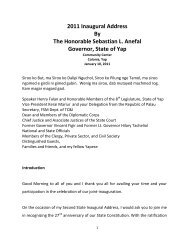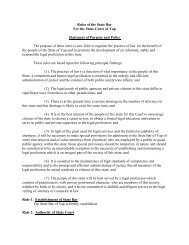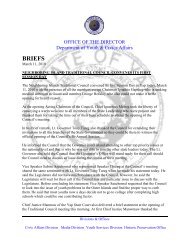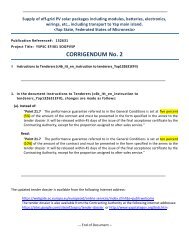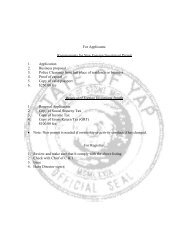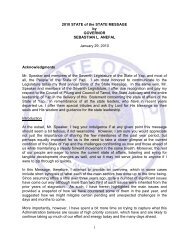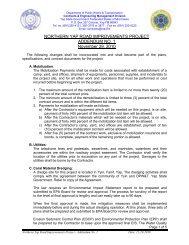RULES OF CIVIL PROCEDURE For the Trial Division of the Yap ...
RULES OF CIVIL PROCEDURE For the Trial Division of the Yap ...
RULES OF CIVIL PROCEDURE For the Trial Division of the Yap ...
Create successful ePaper yourself
Turn your PDF publications into a flip-book with our unique Google optimized e-Paper software.
(1) The phrase "The advisability <strong>of</strong> a preliminary reference <strong>of</strong> issues to a master<br />
for findings to be used as evidence when <strong>the</strong> trial is to be by jury" has been deleted<br />
principally because Rule 53 gives ample opportunity for <strong>the</strong> use <strong>of</strong> masters. This situation<br />
is also rare, and in any event could be raised under clause (4).<br />
(2) A portion dealing with jury trials has been deleted.<br />
(3) A new subdivision (5) is added to reflect <strong>the</strong> hopes that <strong>the</strong> pre-trial<br />
conference may be able to help <strong>the</strong> parties resolve <strong>the</strong> dispute before it goes to trial.<br />
Mention is made to due recognition <strong>of</strong> traditions and customs as a means <strong>of</strong> conflict<br />
resolution as set forth in <strong>the</strong> purpose section <strong>of</strong> <strong>the</strong> State Judiciary Act.<br />
IV. PARTIES<br />
Rule 17. Parties Plaintiff and Defendant; Capacity.<br />
(a) Real Party in Interest. Every action shall be prosecuted in <strong>the</strong> name <strong>of</strong> <strong>the</strong> real<br />
party in interest. An executor, administrator, guardian, bailee, trustee <strong>of</strong> an express trust,<br />
a party with whom or in whose name a contract has been made for <strong>the</strong> benefit <strong>of</strong> ano<strong>the</strong>r,<br />
a party authorized by statute may sue in his own name without joining with him <strong>the</strong> party<br />
for whose benefit <strong>the</strong> action is brought; and when a statute <strong>of</strong> <strong>the</strong> State <strong>of</strong> <strong>Yap</strong> so<br />
provides, an action for <strong>the</strong> use or benefit <strong>of</strong> ano<strong>the</strong>r shall be brought in <strong>the</strong> name <strong>of</strong> <strong>the</strong><br />
State <strong>of</strong> <strong>Yap</strong>. No action shall be dismissed on <strong>the</strong> ground that it is not prosecuted in <strong>the</strong><br />
name <strong>of</strong> <strong>the</strong> real party in interest until a reasonable time has been allowed after objection<br />
for ratification <strong>of</strong> commencement <strong>of</strong> <strong>the</strong> action by, or joinder or substitution <strong>of</strong>, <strong>the</strong> real<br />
party in interest; and such ratification, joinder, or substitution shall have <strong>the</strong> same effect<br />
as if <strong>the</strong> action had been commenced in <strong>the</strong> name <strong>of</strong> <strong>the</strong> real party in interest.<br />
(b) Vacant. (Capacity to Sue or Be Sued)<br />
(c) Infants or Incompetent Persons. Whenever an infant or incompetent person has a<br />
representative, such as a general guardian, committee, conservator, or o<strong>the</strong>r like<br />
fiduciary, <strong>the</strong> representative may sue or defend on behalf <strong>of</strong> <strong>the</strong> infant or incompetent<br />
person. If an infant or incompetent person does not have a duly appointed representative<br />
he may sue by his next friend or by a guardian ad litem. The court shall appoint a<br />
guardian ad litem for an infant or incompetent person not o<strong>the</strong>rwise represented in an<br />
action or shall make such o<strong>the</strong>r order as it deems proper for <strong>the</strong> protection <strong>of</strong> <strong>the</strong> infant or<br />
incompetent person.<br />
Rule 18. Joinder <strong>of</strong> Claims and Remedies.<br />
(a) In General. A party asserting a claim, counterclaim, crossclaim, or third-party<br />
claim may join, as independent or alternative claims, as many claims as it has against an<br />
opposing party.<br />
(b) Joinder <strong>of</strong> Contingent Claims. A party may join two claims even though one <strong>of</strong> <strong>the</strong>m<br />
is contingent on <strong>the</strong> disposition <strong>of</strong> <strong>the</strong> o<strong>the</strong>r; but <strong>the</strong> court may grant relief only in<br />
accordance with <strong>the</strong> parties' relative substantive rights. In particular, a plaintiff may state<br />
a claim for money and a claim to set aside a conveyance that is fraudulent as to that<br />
plaintiff, without first obtaining a judgment for <strong>the</strong> money.



